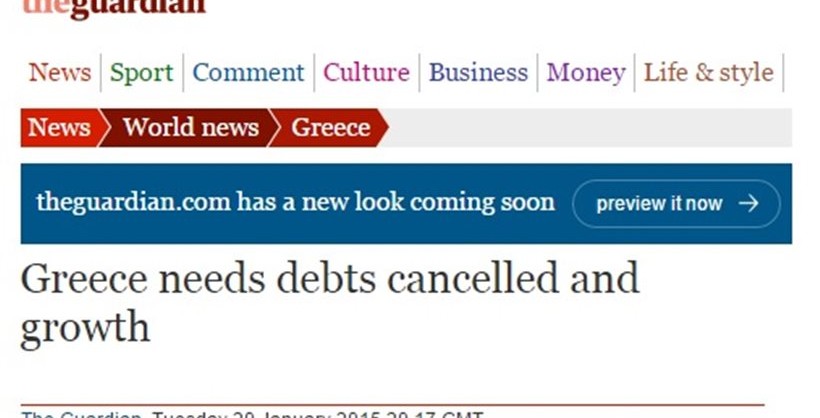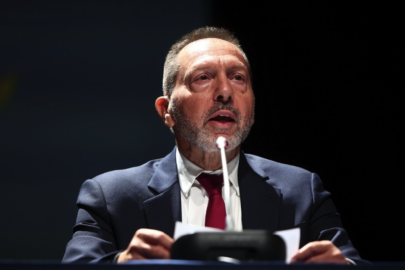In an open letter that was published by The Guardian on Tuesday, 35 economists from around the world ask for the cancellation of a large part of the country’s debt.
More specifically, they urge the troika of Greece’s international lenders, namely the European Commission, the European Central Bank and the International Monetary Fund, to negotiate with the next Greek government towards this direction in order to support the rebuilding of a sustainable economy.
Moreover, the world-renowned economists and professors urge the next Greek government to abandon the austerity program that is currently crushing economic activity and also encourage other national governments to pursue diplomatic activities that will support the cancellation of a large chunk of Greece’s sovereign debt.
Read below the full letter and the lists of economists who signed it, as they were published by the Guardian.
As economists, we note that the historical evidence demonstrates the futility and dangers of imposing unsustainable debt and repayment conditions on debtor countries; the negative impact of austerity policies on weakening economies; and the particularly severe effects that flow on to the poorest households.
We therefore urge the troika (EU, European Centra Bank and IMF) to negotiate in good faith with the Greek government so that there is a cancellation of a large part of the debt and new terms of payment which support the rebuilding of a sustainable economy. This settlement should mark the beginning of a new EU-wide policy framework favouring pro-growth rather than deflationary policies
We urge the Greek government to abandon the austerity programme that is crushing economic activity and adopt a more expansive fiscal policy setting, targeting immediate relief from poverty and stimulating further domestic demand; to launch a fully independent investigation into the historic and systemic failure of the Greek public financial management processes (including any evidence of corruption) that led to the accumulation of debt, the disguising of the size and nature of the debt and the inefficient/ineffective use of public funds; and to consider the establishment of a judicial body or alternative mechanism that is independent of government and charged with a future responsibility of investigating corruption from the highest to lowest levels of government.
We urge other national governments to exercise their votes within official sector finance agencies and to pursue other diplomatic activities that will support a cancellation of a large part of the Greek sovereign debt and new terms of payment for the rebuilding of a sustainable Greek national economy.
Malcolm Sawyer – Emeritus prof, University of Leeds
Danny Lang – Associate prof, University of Paris
Prof Yu Bin – Professor and deputy director, Chinese Academy of Social Sciences
Prof Ozlem Onaran – University of Greenwich
Prof Mario – Seccareccia University of Ottawa
Hugo Radice – Life fellow, University of Leeds
John Weeks – Professor emeritus, Soas, University of London
Prof Howard Stein – University of Michigan, Ann Arbor
Anitra Nelson – Associate professor, RMIT University, Melbourne
Prof George Irvin – University of London, Soas
Dr John Simister – Manchester Metropolitan University
Mogens Ove Madsen – Associate professor, Aalborg University
Wang Zhongbao – Associate professor, editorial director, World Review of Political Economy
Dr Susan Pashkoff – Economist
Andrea Fumagalli – University of Pavia
Pat Devine – University of Manchester
Professor Ray Kinsella – University College Dublin
Alan Freeman – Co-director, Geopolitical Economy Research and Education Trust
Eugénia Pires – Economist, member, Portuguese Citizens Debt Audit
Dr Jo Michell – University of the West of England, Bristol
Michael Burke – Economist, Socialist Economic Bulletin
Paul Hudson – Formerly Universität Wissemburg-Halle
Dr Alan B Cibils – Universidad Nacional de General Sarmiento, Buenos Aires, Argentina
Guglielmo Forges – Davanzati Associate prof, University of Salento
Prof Sergio Rossi – University of Fribourg
Faruk Ulgen – Associate prof, University of Grenoble
Tim Delap – Positive Money
Eleni Paliginis – Middlesex University
Grazia Ietto-Gillies – Emeritus professor, London South Bank University
Professor Radhika – Desai University of Manitoba
Michael Roberts – Economist, ‘The next recession’
Michael Taft – Unite the Union, Ireland region
Dr Andy Denis – City University London
Peter Kenyon – Chartist
Professor Emeritus Geoffrey Colin Harcourt UNSW Business School





































